| Srl | Item |
| 1 |
ID:
142020


|
|
|
|
|
| Summary/Abstract |
Since the leadership transition in China in November 2012, there have been significant changes in Chinese foreign policy. It has been widely observed that under the new leadership headed by President Xi Jinping, Beijing has become more assertive in international affairs. This paper ex- amines the emerging contours of China's foreign policy under Xi and the implications for the future regional order in the Asia Pacific. It argues that recent international behaviour of China is the manifestation of a new phase of Chinese foreign policy that could be defined as ‘peaceful rise 2.0’. In this analysis, while Beijing still adheres to its declared ‘peaceful development’ policy aiming to maintain a stable external environment conducive to its ascendance, the manner in which it seeks to do so are considerably different from past decades. The paper further argues that despite China's growing power, President Xi faces greater difficulties than his predecessor to achieve his foreign policy objectives. Indeed Beijing's capacity to shape the regional environment in its favour in the near future is arguably declining rather than increasing.
|
|
|
|
|
|
|
|
|
|
|
|
|
|
|
|
| 2 |
ID:
142021
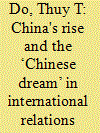

|
|
|
|
|
| Summary/Abstract |
The rise of China/East Asia and the perceived decline of the US/West pose an emerging question about how international relations (IR) theory should respond to this change. Increasingly, there have been heated discussions among Chinese IR academics over a desirable Chinese contribution to IR theory (IRT), particularly the possibility of building a distinctive Chinese IRT. Inevitably, this drive towards theorizing from a Chinese perspective also creates a backlash among not only Western but also other Chinese scholars as they question the ‘nationalistic’ if not ‘hegemonic’ discourse of the scholarship. Drawing on the sociology of scientific knowledge framework, this article examines the linkages between the vibrant dynamics of the Chinese theoretical debates and the actual practices of Chinese scholars in realizing their claims. It suggests that this investigation can serve as a springboard into a better appreciation of the theory–practice and power–knowledge relationships in the context of Chinese IR.
|
|
|
|
|
|
|
|
|
|
|
|
|
|
|
|
| 3 |
ID:
142026
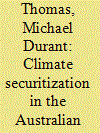

|
|
|
|
|
| Summary/Abstract |
This paper analyses the response by the Australian political–military establishment to climate change through the lens of securitization theory. The research used mixed content analysis techniques to systematically examine more than 1500 speech-acts, policies and doctrinal articles between 2003 and 2013. It argues that the Australian Defence Force (ADF) was not a climate securitizing actor and that its response to climate change was mediated by the political partisanship surrounding broader national policy debates on climate change. The politicization of climate change made it increasingly difficult for the ADF to publicly adopt meaningful climate policies. It subsequently crafted a strategy that minimized any investment (resource or reputational) lest a change of government rendered them invalid or it drew unwanted criticism. At the very heart of this finding exists the challenge of an avowedly apolitical institution responding to what emerged in the Australian context as a politically partisan security issue. The more serious indictment concerned how national security policy (in the context of climate change as a security issue) became hostage to the politics of climate change.
|
|
|
|
|
|
|
|
|
|
|
|
|
|
|
|
| 4 |
ID:
142025
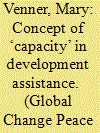

|
|
|
|
|
| Summary/Abstract |
The idea of capacity development has become ubiquitous in discussions of development assistance: a lack of capacity in developing countries is frequently identified as the main obstacle to development and building ‘capacity’ is seen as the most important output of development assistance. The terms ‘capacity development’ and ‘capacity building’ are, however, relatively new in development assistance discourse, having only come into frequent use in the last two decades. This paper examines the history and different uses of the concept of capacity in development assistance literature, tracing its origins and rise in popularity. Although a large amount of material has been produced on the topic there is no clear agreement on what it means, with a range of interpretations used by different authors and in different contexts. The more expansive and ambitious approaches promoted by some development organizations have a number of theoretical and practical difficulties and it is argued that the wide and imprecise use of the term has undermined its usefulness.
|
|
|
|
|
|
|
|
|
|
|
|
|
|
|
|
| 5 |
ID:
142022
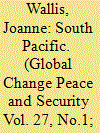

|
|
|
|
|
| Summary/Abstract |
The term ‘arc of instability’ was first used in 1999 to describe the security challenges facing the South Pacific. It subsequently came to dominate Australian political discourse, although its veracity was critiqued. This article considers how Australia's political discourse about the region has evolved since 1999 and what impact this has had on Australia's relationships in the region. It begins by outlining why the arc of instability characterization emerged and how it contributed to the securitization of the South Pacific, which justified Australia's policy of new interventionism in the region. It concludes by considering whether it might be time to recharacterize the region as an ‘arc of opportunity’. This recharacterization may shift the political discourse to focus on the South Pacific's potential and opportunities, desecuritize Australia's relationship with the region and diffuse concerns about continued Australian intervention by articulating a more cooperative approach.
|
|
|
|
|
|
|
|
|
|
|
|
|
|
|
|
| 6 |
ID:
142024


|
|
|
|
|
| Summary/Abstract |
Networks of trade union activists working as part of the global union movement have played a central role in political change in Myanmar. In response to trade union advocacy, compliance with International Labour Organization (ILO) standards was made a key condition for the lifting of sanctions on Myanmar, leading the current civilian government to pass revised labour laws allowing the formation of independent trade unions. Union activists have taken advantage of this new freedom, with a rapid growth in registration of local union organizations since 2011. Based on recent fieldwork in Myanmar, including interviews with union leaders and ILO officials, this paper presents an empirical analysis of political relationships formed by local and international union organizations in the context of multi-level political change. In this case study of translating international norms into domestic political change, local and international trade union networks are shown to have a significant impact on achieving compliance with international labour standards.
|
|
|
|
|
|
|
|
|
|
|
|
|
|
|
|
| 7 |
ID:
142023
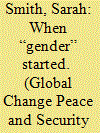

|
|
|
|
|
| Summary/Abstract |
This article examines gender mainstreaming processes in successive UN peacebuilding missions in Timor-Leste, with a focus on the relationship between these missions and the national women's organizations who were vehicles for implementation. Apparent frictions occur in this process and the article suggests that the gender rhetoric and practice incorporated into UN peacebuilding since 2000 can have potentially destabilizing effects for women's activism in post-conflict settings. Women's organizations socialize and negotiate around gender norms in order to mitigate this potential and aim to identify the synergies between women's activism before peacebuilding, and gender mainstreaming policies and practice post-conflict. This article provides insight into how national women's organizations socialize gender norms, as well as how women's post-conflict activism can be shaped by the presence of UN peacebuilding.
|
|
|
|
|
|
|
|
|
|
|
|
|
|
|
|